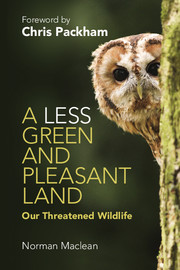Book contents
- Frontmatter
- Dedication
- Contents
- List of wood engraving illustrations
- Foreword
- Acknowledgements
- Introduction
- 1 Living with change
- 2 A short dose of Earth history
- 3 Climate change
- 4 Down on the farm and into the woods
- 5 Plant and animal introductions (and some recent arrivals)
- 6 Our overcrowded isles: human population and aspiration
- 7 Fresh water: quality and availability
- 8 Hunting, shooting and fishing: the enigma of field sports and wildlife
- 9 Wildlife conservation at home and overseas
- So how is our wildlife faring? The details
- Glossary and abbreviations
- Notes
- Index
- Plate section
8 - Hunting, shooting and fishing: the enigma of field sports and wildlife
Published online by Cambridge University Press: 05 April 2015
- Frontmatter
- Dedication
- Contents
- List of wood engraving illustrations
- Foreword
- Acknowledgements
- Introduction
- 1 Living with change
- 2 A short dose of Earth history
- 3 Climate change
- 4 Down on the farm and into the woods
- 5 Plant and animal introductions (and some recent arrivals)
- 6 Our overcrowded isles: human population and aspiration
- 7 Fresh water: quality and availability
- 8 Hunting, shooting and fishing: the enigma of field sports and wildlife
- 9 Wildlife conservation at home and overseas
- So how is our wildlife faring? The details
- Glossary and abbreviations
- Notes
- Index
- Plate section
Summary
Let me say at the outset that the conclusion of this chapter will be that, on balance, field sports can, and sometimes do, benefit wildlife. On the face of it that sounds surprising. It seems somehow counterintuitive that the pursuit of ‘game’ species could have the effect of benefiting wild animals and plants, especially when certain of the game species – ducks, geese, partridge and woodcock – include some of the very species which we are trying to conserve. But taken together, I hope to persuade you that when you have read this chapter and weighed up the pros and cons, you will agree with that conclusion. However, I am not trying to pretend that field sports as currently practiced always benefit wildlife. Far from it. At worst they can wreak great harm. So the operative word is can.
The rationale behind the assertion that field sports can benefit wildlife is as follows:
Firstly, the management of farmland to benefit pheasant and partridge shooting often involves the growth of crops and the development of short shrub or herb cover to provide food and shelter for the released game birds. Some wildlife will also thrive better with such provision.
- Type
- Chapter
- Information
- A Less Green and Pleasant LandOur Threatened Wildlife, pp. 106 - 124Publisher: Cambridge University PressPrint publication year: 2015



